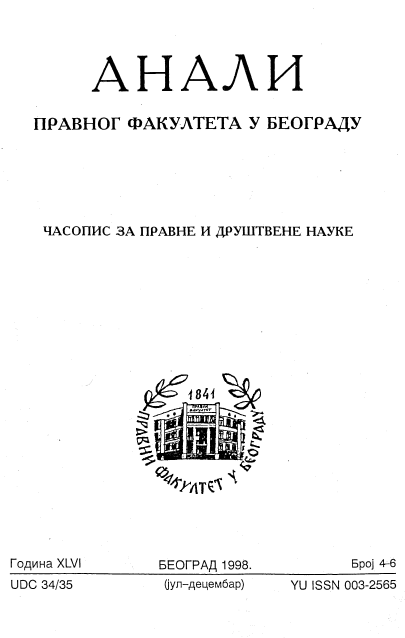
We kindly inform you that, as long as the subject affiliation of our 300.000+ articles is in progress, you might get unsufficient or no results on your third level or second level search. In this case, please broaden your search criteria.


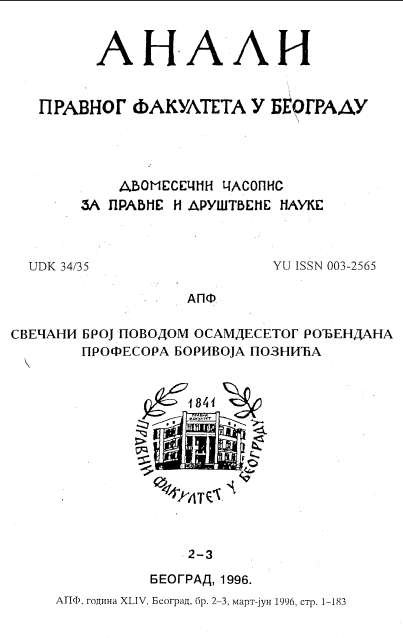
(1) Structurally, the state property consists of public and private domains. In case of the state public property, it is possible to distinguish general and the so-called administrative property, the relevant criterion being the availability and purpose of the property. It is subjected exclusively, or at least partially (administrative public state property), to the norms of public law. The private (fiscal) state property refers to various sources of means intended for feeding the treasury. It is regulated only by the norms of civil law. (2) The legal institute of public domain, namely public thing (property), by all means, transgresses to quite a degree the limits of object of the state public property. The decisive criterion for distinguishing the former category from the other ones is — or should be — their dominant purpose: they serve, entirely or partially, directly or indirectly, to public and not to private purposes. The principal dividing line according to the French and German conceptions of the public domain (public property or thing) lies in the fact that the former presupposes a separate and unavoidable notion of public ownership, namely of the ownership of the subject having the position of entity in the sphere of public law, while the German conception only emphasizes the legally modelled public-law status of specific things, independently of the nature of the subject of the right of ownership in the concrete case. It seems to the author that, without entering in a more detailed analysis — de lege ferenda — the German model would be more appropriate to Yugoslav legal environment. (3) The state, property of the Federal Republic of Yugoslavia is expressed in its legislative form as an inconsistent mixture of rights and object (things). Still, it is possible to discern within it some components of both administrative public, and private (fiscal) property. As far as the scope of the state ownership is concerned, the lack of coordination is visible between the republic (Serbia) and the federal constitutions; also present are deep legislative lacunae or even anachronous normative solutions.
More...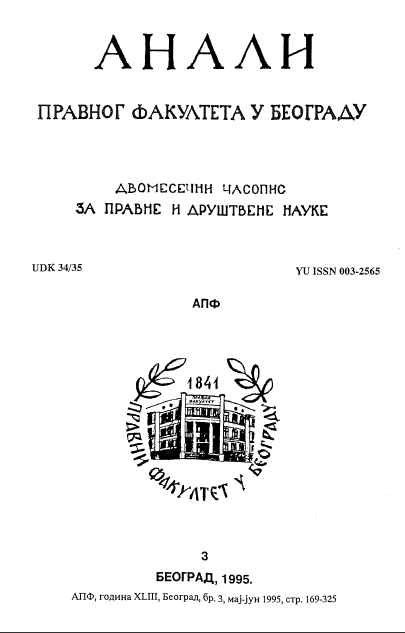
The period of classical Athens is not only a culmination of Athenian culture; it marks at the same time a period in which the Athenian political, military, and cultural powers have made possible for that polis to raise - at least at the ideological and theoretical levels - the question of political unification of the Hellenic world on the foundations of its cultural unity, permeated predominantly with cultural achievements of the Athenian polis. Athenian imperalism strived, and partially succeeded, to use the supremacy of that city in the most important aspects of spiritual and artistic creativity, for its expansionist aims. With the exception of Sparta, where there existed an active hostility to Hellenic culture, in oligarchic poleis - rivals of Athens, one did not notice any considerable resistance to Athenian cultural influences. This did not necessarily mean that cultural propaganda of the Athenian democracy has been particularly efficient. New cultural values, as developed in the second part of the fifth century', have considerably been instrumental in the process of dividing into layers of the Athenian society, while forming, to quite a degree, political attitudes of various social layers. Spiritual revolution effected by sophistis, particularly in the sphere of morals, has been objectively aimed against the ruling political order and its ideology, although some of the sophists, such as Protagoras, have expounded new arguments in favour of democracy. During the War of Pelopponesus, together with the increase of external pressure and internal tension, hindering more and more normal functionning of institutions of Pericles’ democracy, have brought about final rift between the members of Athenian cultural elite and the great majority of the demos. This process has found its expression in early Aristophanes’ comedies and Plato’s dialogues. The death of Socrates marks the culmination of the cultural struggle being waged in Athens for almost a century, i.e. since the disintegration of the aristocratically oriented culture of the Archaean era.
More...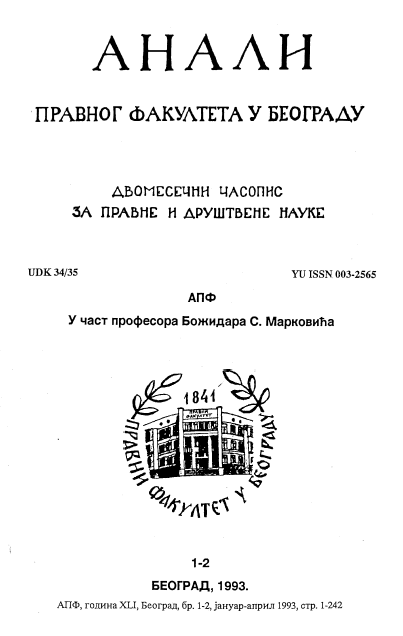
In every political community, as part of its civilisational culture, there exist certain historically permanent forms of spirituality, which include also significant laws, as well as deeply rooted ideas of justice, equity and the like. These key knowledge are characterized by historical elements - the ones which influence the specific legal system of every community. The past is present in all actual social events, exerting thus necessarily an influence on the present times. Significant role is played also by historical awareness. Its structure may be compared to legal awareness, and both mentioned forms of social consciousness, in addition to the cognitive, contain also axiological moments. They may correct day-to-day picture of everyone about the past. These messages influence our general view of the world, which includes our ideas of the existing state and legal order. The relationship between the law and history may be analyzed from two different stanдрoints. If one conceives law in a narrow way, namely as a collection of norms, or an instrument for achieving specific goal - the influence of law on history is minimal. In the contrary case, if are conceives law in a wider way, namely as a part of the culture of society, mentioned influence may be rather significant.
More...
The attempt to define a sociologically relevant formal logic and determine its significance for the phenomenon of law has three theses. The first: for the first time in history law appears, stricto sensu, in Greece - namely, not only its rudiments. The second: appearing of law presupposes the existence and implementation of formal logic in the normative sphere (namely, in this respect law is distinguished from custom and morals). Finally, the third thesis: in order to implement formal logic in the sphere of law it is necessary to have a minimum of balance of power in a society, which makes possible separation of legislative power from the judicial and "executive" ones. Central issue in the present study is the analysis of Aristotle’s logical and social theory. The first refers to a rather high degree of formalisation of thinking reached by Greek philosophers of that time, while the other to the level of experience relating to the division of power, commensurate to the existing balance of power of principal social groups in the polis. This is not accidental: only those societies knowing social conflicts which are not settled by force, but by discussion and meritorous decision of a third party, are able to develop formal logic, which is in the very foundation of the phenomenon of law. Although the principal goal of that logic is to prevent psychical and social processes of destruction of sense of normative structures, it only attenuates and modifies them, channelling them within a closely connected sphere of law.
More...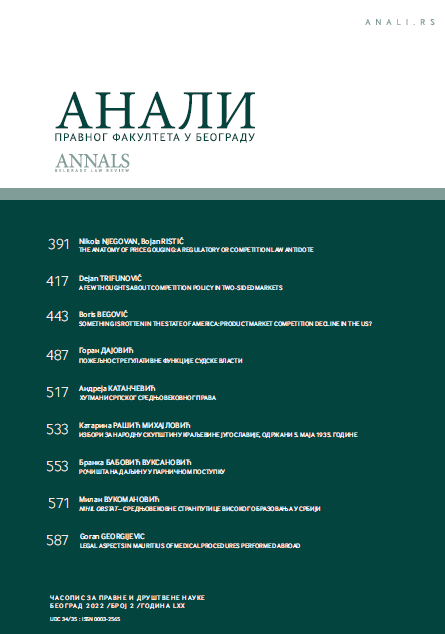
The subject of the paper is the institute of hutman in Serbian medieval mining law. The first question to be answered is related to the extent of transplantation of the institute from Saxon customs to Serbian written law. The second aim is the definition of the competence of hutman and the way he was appointed. The results indicate the Despot Stefan’s Mining Code recognized two different institutes of hutman. The first was auxiliary service to urbarar, measuring and marking the land in the procedure of granting mining concessions and after breaking one mine into another, charging a fee. He was probably appointed by tax collectors. The second one is the supervisor of a mine, entitled to collect the payment from the owners of its shares, to record it and presumably to take care of correct conducting all kind of activities in the mine. Most likely he was employed by the shareholders of the mine partnership. The linguistic, systemic, and historical interpretation is applied as well as the comparative method and regressive analysis.
More...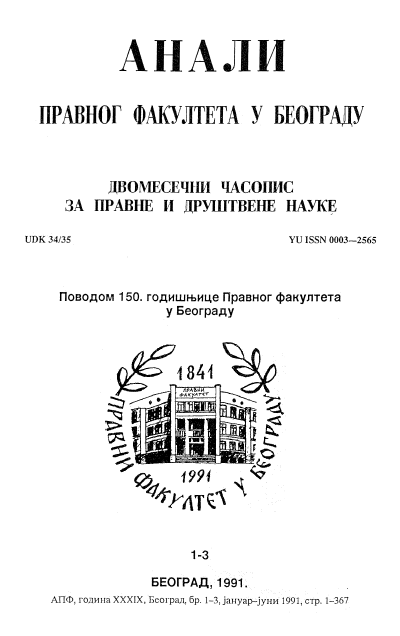
The author tries to find out the real meaning od the term katoikodomeîn in the speech of Athenian author of judicial speeches Isaeus, VIII41. This word is usually interpreted by translators as .imprisonment" and the like. The use of this word is analyzed at Pseudo-Xe- nophont, Aristotle and Strabon and the conclusion follows that its basic meaning - „build up", „construct" in the above context does not amount to an understandable meaning. The author therefor considers that the term katoikodomeîn at this point has a specific juridical meaning. He challenges Wyse's assumption that the captive was under a duty to take part in the army or to pay his debt to the state, and that he was disfranchised because of his failing to appear at the appointed time. On the ground of logical-rethorical and tactical structure of the speech, procedural position of the parties, connection between the notions katoikodomeîn and epiboulein, the analysis of the indictment graphe hybreos - which was lodged in this case, as well as of comparative law arguments (especially the institute of ličenje, namely deprivation of one's fights and exclusion in customary law of Albanians), the author submits that katoikodomeîn was a kind of self-isolation within the house, where the person loosing the good name retreats. Independently of the degree of acceptability of this hypothesis, the author emphasizes that in any case this word does not signify the imprisonment - in the classical sense, so that translations interpreting in such a way this term are not adequate.
More...
The idea of historicism in explaining society, state and law was dominant in spiritual activities in many periods. After, at the beginning of XIX century, the attimde was changed toward the conception of the history of positive law, it was possible to establish a new - historical school of law. It originated in Germany after the French bourgeois revolution when the ussue arose as to whether it was necessary to codify legal rules in that country. As an answer to Tibault's support for codification, Savigny has published his Vom Beruf wiser Zeit For Gesetzgebung und Rechtswissenschaft - a book which had a decisive influence in postponing the adoption of the Code. The ideas and arguments in this book are the mainstream of the historical school of law. The spirit of people (Volksgeist) as a common and general conviction gives rise to and determines the law of the people, just as its language. The law which originates in the spirit of people is developing rather slowly and in an evolutionary way and, while not changing the substance given by that spirit, undergoes through three stages of its development, namely: unconscious and undeveloped customary law, scientific law, and legislation. On the ground of such premises, one may conclude that the codification of German private law would be in vain, since German law of the period was still in the stage of customs. These ideas were accepted also on the other side of the river Rhone, namely in the francophone countries, where they become, at least for some time, a significant counterwight to the conceptions of the dominant exegetic shool.
More...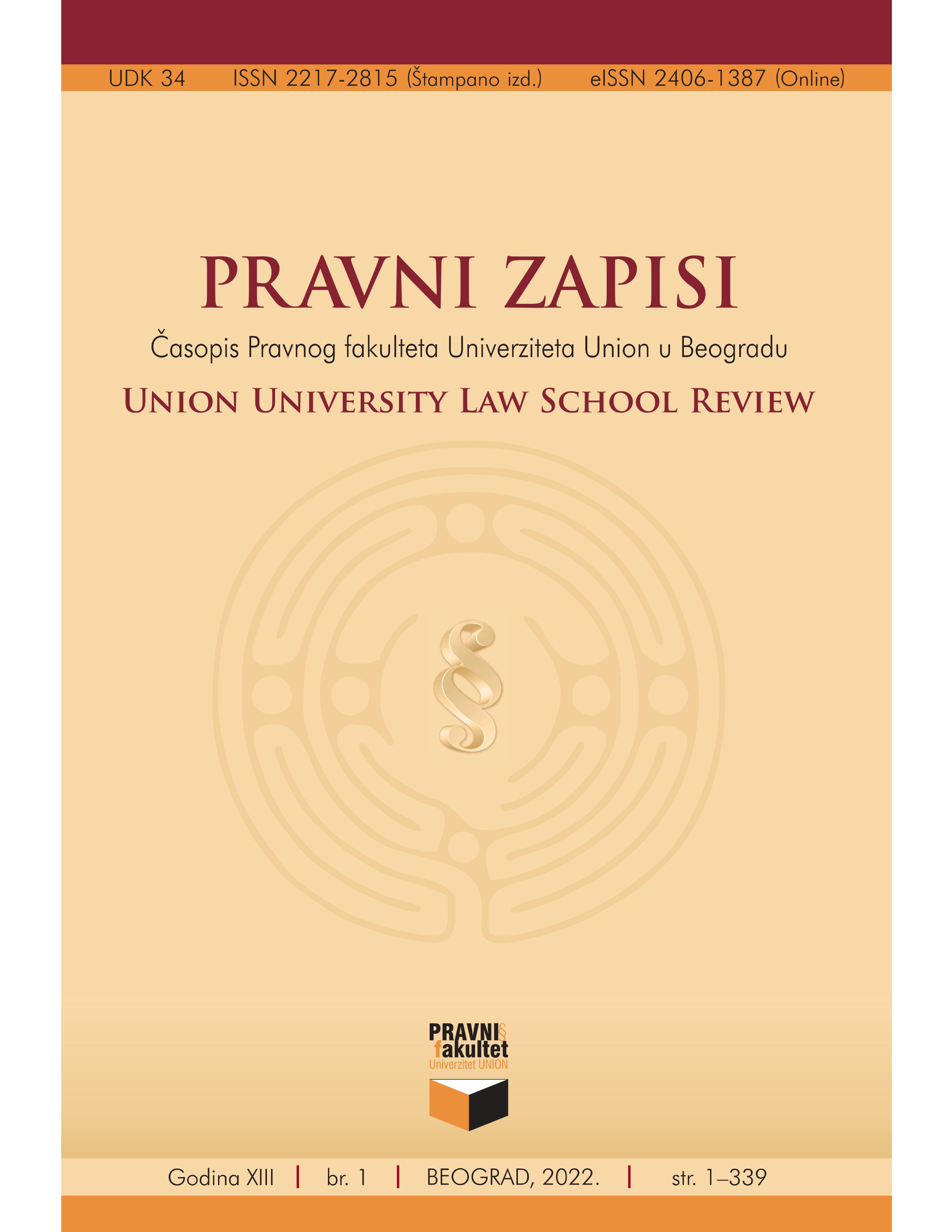
The purchase contract, often referred to as sale and purchase (πρᾶσις καὶ ἀγορασία) as an illustration of its twofold nature derived from the Roman legal tradition, or simply as sale (πρᾶσις), is suitable for analyzing different legal issues. In light of typical Byzantine document named πρατήριον ἔγγραφον, we aim to define the nature of purchase contract in this medieval legal system. Diplomatic formulae contain data about consensus of contractual parties, as well as the fact that a document was drafted “for security”, which raises the question of solemnity of this contract. The role the deed has is also discussed in the paper, as in some cases it is uncertain whether the composition and delivery of the document also implied the passing of title. Applied methodological approach takes into account the linguistic interpretation of documentary clauses and legal provisions in codes, and relies on comparative-historical method.
More...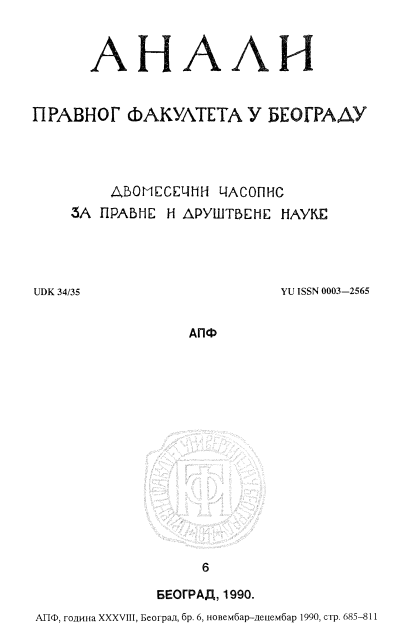

Gligorije Trlajić is one of the unjustifieldy forgotten learned Serbs of the end of XVIII and the beginning of the XIX century. He was one of the first holders of a doctorate of legal sciences and, probably, the first Serbian university professor. His courses were legal history and encyclopedia of law at the universities of Harkov and Saint Petersburg. In addition he was interested in poetry and translation. He was bom in a needy family in the town of Mol in Voivodina. Eager to acquire knowledge, he run away from home and his sheep. After being accepted by a rich Serb in the town of Segedin, he graduated philosophy and then law. As a learned Serb, speaking four languages, he was noted by the Russians minister in Vienna - the count galicin. After Galicin's death he goes to Russia, Saint Petersburg. In the year of 1804 - namely the one of the uprising in Serbia against the Turks, he had the honour to deliver the opening lecture in the presence of Alexander the First, Russian emperor. We are in possession of his treatise in French relating to natural law and methodology of the history of law. It shows that he has mastered the ruling conceptions of law and history of his times. Although livin in a fedual empire, Trlajić sympathizes new ideas in Europe which destroy old systems and introduce the new ones. He has done translations of poetry and drama from French, Russian and German, but also wrote poetry encouriging fighters in the Uprising in Serbia, while pleading for concord. Tormented by nostalgia and with ailing health, he tried in 1811 to travel to his native land. However, he died of tuberculosis in Russian village Resnoe in 1811, when he was fourty five.
More...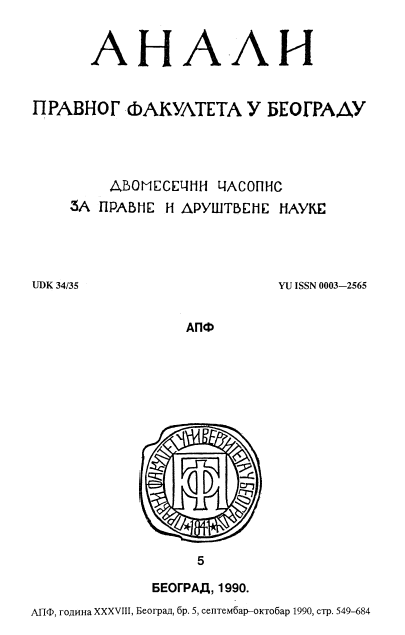
In the places of Martinići and Krusi the Montenegrins have been victorious in 1796 against the Turks and these events made possible the realisation of the historical goal — the restoration and creation of the State. On October 8, 1798 the Code under the above title has been enacted in the monastery Stanjevići which was followed by electing the Governorship od the Montenegrin and Mountains Court. The State and the Code are negations of Montenegrin tribal organisation and customary law. Instead of self—assistance of the individual and the collectivity, the State and its sanctions emerged. The issue of the application of the Code sheds the light on the realities of the Montenegrin State. Previous and author's own research show that the Code has been implemented much more than supposed before. In some periods the court practice was not steady and intensive, the causes including wars, diseases, famine and arbitrariness. The means and methods of consolidation of State organisation and, related to this, of implementation of the Code in practice by the intention and efforts of the ruler Peter the First to adapt this process to the needs and possibilities of society. One of the positive aspects was the victory of the State and of written law which meant the suppressing of tribal unbridled behaviour.
More...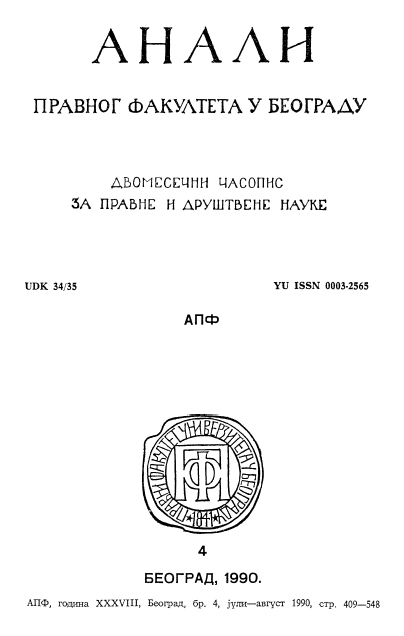
New arguments and new results are presented in relation to the origin and characteristics of the fief in the medieval Serbia. First analyzed are some data from the well-know King Milutin's charter in favour •of the Skoplje monastery of St. Georege (1299—1300), which indicate that soldiers mentioned in articles 33, 34, 35 and 69 are not fief-holders; the notion of the fief-holder, namely, does not always imply a person granted State land against the duty to serve in the army. This is confirmed also by the data from other Serbian documents of XIVth century. The author" further tries to prove that Serbian XIII century soldiers did not originate out of Byzantine stratiots and that they are rather similar to the" Croatian-Hungarian ”predyials". Analyzed is also the notion of "prdalitcha” from the certificate of Bulgarian emperor Konstantin Asem issued to the benefit of already mentioned Skoplje monastery, while trying to prove the untenable position of Panaiteskuova and Mošin concerning the matter. Also analyzed is the phenomenon of "prnyavor" (prnjavor) (a settlement near the monastery) in Serbia and Bosnia, while concluding that those people were not fief holders (pronijari) but serfs (dependent peasants). Finally, the author considers the institution of fief in the Zeta Province under the Venetian rule, while indicating important results reported by I. Božić.
More...
Intensive carrying out of the economic reform, new development policy of Yugoslavia, and new plans, greater role of the market and independence of participants in the economic activity, the pluralism of different types of ownership, de-regulation of the economic system, as well ajs the need for developing a more efficient and appropriate system of social planning — required the enactment of the Law on Foundations of the Social Planning System and on the Social Plan of Yugoslavia. Following are its basic characteristics: simplification of the planning procedure, and a new approach to planning and market; the duty of participants in the economic activity to plan, but not to enact the planning acts: simultaneous and continued planning; greater significance of joint plans; narrowing down of the substance of plans of the socio-political communities, but at the same time more efficient instruments for the realization of the plans; introducing a program of measures of economic policy of the Federal Executive Council; compulsory and indicative part of the plan of the socio-political community; greater role of the macro- -proportions; controlling function of the executive agencies; and the elaboration of the unified methodology of social planning.
More...
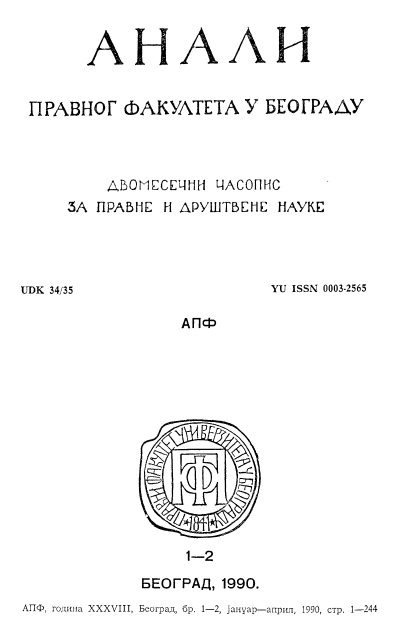
The renaissance of the science of law and the fast success of the Bologna School would be inexplicable phenomena without seeing multiple conections between the learned methods and the practice of law effected by jurists of education. Traces of new style in judical acts may be found in the transformation of the form notitiae iudicati at the beginning of Xllth century. But already in the Xlth century one may find m the arengae of several verdicts of Ravena the literal transcription of texts of the Code and the Novels, without express quotation. In Rome by the end of the Xth and in the Xlth century one finds several times in the placita Justinian sources (in essence the Code), without direct quoting. The first direct quotation is dated 1060. Roman law has remarquably influenced also the field of the evidence law: disappearance of coniuratores, replacement of the ancient way of expliculpation by using boiling water and hor iron as well the oath by rational proofs, the transfer of the onus probandi from the defendant to the plaintiff, the greater role of the written evidence. The protagonist of this phenomenon are the causidici, the legispe- riti, and the doctores legum more than the judges themselfes. The judges have not always been free to take decisions, because their actions were to quite a degree influenced by the political factors (the pressure by authority or the environment). Gradually, Roman law became a mighty tool, and not just one law among the others, but the law above all particular laws, local, personal, customary.
More...
The Kossovo Battle anniversary provoked the author to discuss the life of Serbian state as a Domain of Despot in the first half of the XVth century. As a well organized, although dependent legal state, and exposed to constant wars and Turkish invasion, it was able to provide its population with economic and cultural stability. The topic of this study relates to legal organization of the Novo Brdo town in XVth century and the basic source for it are the fragments of the Town Law which were added to the Law on Mines of Despot Stefan Lazarević, of 1412, the manuscript of which was discovered and published thirty years ago. After an introduction on economic and social situation, the issue is discussed of whether at all the above Law did exist, or the Law on Mines was only supplemented with 23 articles containing the provisions connected to the life in the town. The existing of a separate town law points at the achieved degree of town autonomy, so the author treats in more detail the status of towns in medieval Serbia in general. There is a difference between seaside and continental towns, the former having their own statutes, while the latter ones regulating their relations by charters. Article 137 of Dushan's Code witnesses this fact as to emperor’s towns (the same stanдрoint is expressed by St. Novaković, but not by T. Ta- ranovski). Novo Brdo town, too, probably vas an emperor’s town, but there is no data that charters have been issued to it by Duke Lazar or Despot Stefan, too, although some indications thereof do exist. Structure of population, organization of power and judiciary may be deduced from the above mentioned fragments of legislation, a sort of particular town law. Population was, thus, divided into citizens in full right, foreigners who may also be habitatores (citizens of Dubrovnik town), workers and peasants on the town land belonging to church. The miners, with come from Saxony may be citizens or only workers in the town, but their status becomes privileged through a whole series of regulations. Separate layer includes so-called bachelors, who probably are armed guards of the authority and of traders ("Latin bachelors"). There are no slaves. The highest agency of power in the town and the representative of the Despot is the voivode (governor), but significant functions pertain also to the archpriest who is at the top of Church organization. Local bodies of authority, most probably electable, are the duke and twelve fellows (purgars), while town assembly meets only onspecial occasions. Officials in the town of the highest authority are customs officers and urbarars. There is a court of general jurisdiction and the courts competent for the mine and the smeltery. Competent for disputes involving higher amounts is the council. In case of general jurisdiction courts, the council consists of voivode, duke, archpriest, twelve purgars and "good people", while the composition of mining courts is not clear. Finally, there exists the Church court. In some cases particular law is more detailed than the provisions in Dushan's Code, or even departs from it. There are many regulations concerning commerce, duties and distribution of revenue to various organs of authority. Real estate had to be recorded when in trade (”nomic book of title"), which indicates an organized town office. Novo Brdo undoubtedly had considerable degree of autonomy and may be compared with the towns in central Europe, but the development of town self-government and particular town law had been brutolly interrupted by Turkish occupation.
More...
Gaius was the first to create a genuine system of law (personae — res — actiones). All efforts to negate the authenticity of this work are not convincing. This system has influenced his contemporaries and the jurists of third century, in spite of the fact toat they fail to quote him. According to Honoré, Gaius is the spiritual father of Justinian's codification. Justinian's Institutions have adopted the tripartite system, which applies also to many fragments of Gaius' conceptions. Following the plan of Gaius institutes is that through, that the matter of succession remains divided between book II and III. Traces of Gaius' influence are found again in course of the Middle Ages until modem times, and not only in legal studies, but also in those of philosophers and historians. Accurse has wrongly understood the term personae as meaning slaves. Other commentators tried to replace the ac- tiones with obligations. In spite of that, in global terms the scheme stays valid —codifications of customary law put forward the rules according to the system of Institutes and even have the name which reveals the influence of Gaius (e.g. Tripartitum of Verbozy). Young Marx has written a commentary of civil law according to the tripartite system. According to Kelly, Roman law has been the essence of higher education in Europe in course of centuries and the Institutes, first of Justinian and then of Gaius, constituted one of the basic handbooks in western civilization. The tripartite system represents one of the most durable monuments of human thinking.
More...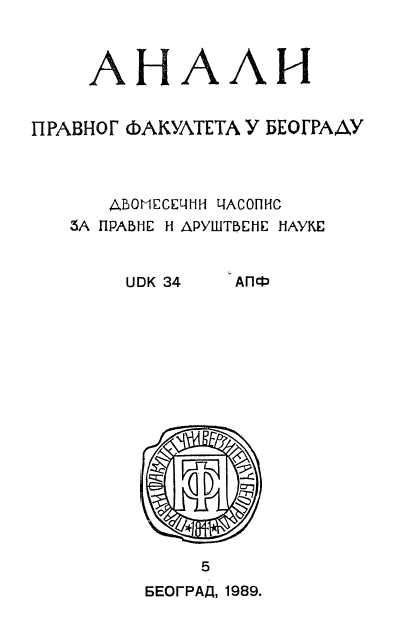
The issue in the present article relates to the justification of the generally accepted view according to which the Venetian procedure is „in essence the Roman-law procedure” (Salvidï). This is why first to be analyzed is Justinian's procedure with the libel, which is compared to the Venetian one. The corresponding basic difference is the following: the lattei procedure is not iniated by a written „announcement of the dispute” to the defendant; the defendant is, namely called orally, whale even then he is not informed about the reason for summoning him. This difference ther gives rise to many others. Just the contrary, it seems that Venetian mediator may be connected to Justinian's procedure, where court office is responsible for the idoneity of the warrantor, namely of his suitability. Since in the early medieval Ravenian procedure the trial was usually held in public spaces, and in the presence of a considerable number of reputed people, the court office has relatively lost its significance, while the guai- antying for the suitability of the warrantor has been assumed by the outstanding individual jurors. In Venice this guaranty was transferred to the evidence procedure where, in addition to the warrantor, the mediator took an active part, in the beginning period as a „warrantor for the warrantors”, while subsequently he had lost in importance, being transformed into a mere witness, only to finally 'disappear during the 13th century.
More...